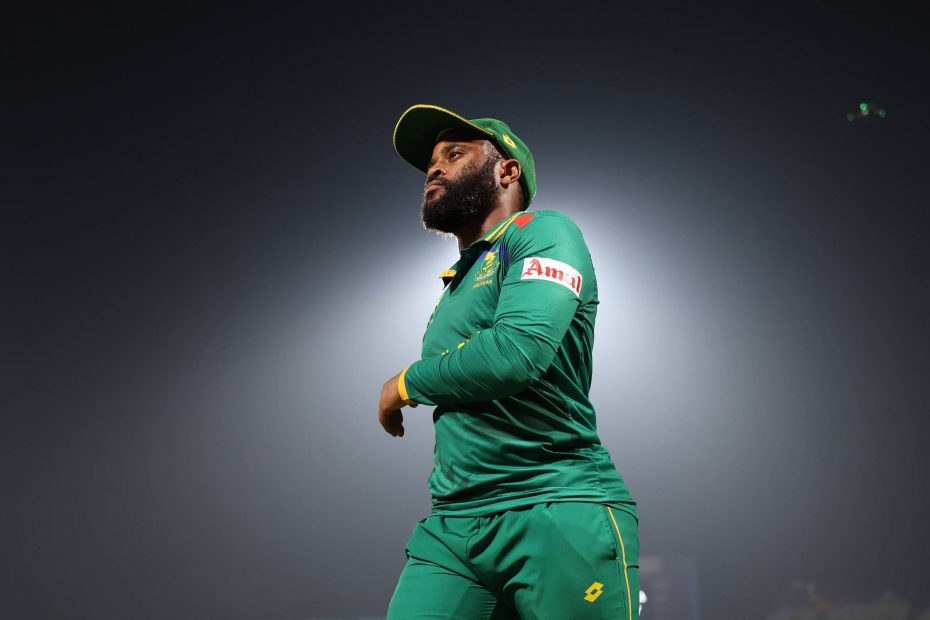South Africa’s cricket team has been panned at home for taking a risk on injured skipper Temba Bavuma in their thrilling loss to Australia in the World Cup semif-final.
Bavuma was slated for taking his place in the game despite having a hamstring injury. He scored a duck and his captaincy decisions were questions.
“Failures of leadership, a lack of temperament, technical and tactical ineptitude. It was the same old South African World Cup story, unfolding under the watch of an incompetent captain, Temba Bavuma,”wrote Ryan Vrede in SA Cricket Mag.
“Already there are those calling this defeat “brave”. There could not be a more flawed characterisation of a performance that saw South Africa crash out of the World Cup. You don’t get to fold in the most fundamental ways and have the benefit of having your effort called brave. It was an abject failure by every meaningful metric.”
Temba Bavuma of South Africa walks off the field following defeat in the ICC Men’s Cricket World Cup India 2023 Semi Final match between South Africa and Australia at Eden Gardens on November 16, 2023 in Kolkata, India. (Photo by Matthew Lewis-ICC/ICC via Getty Images)
He added: “His leadership has been cited as a reason for his retention, despite his dreadful batting form. Yet it is abundantly clear that he doesn’t have the temperament or talent, as a batsman or captain, to withstand the pressures of a World Cup. A bilateral series, sure. But not a marquee tournament where pressure is ever-present.”
The decision to play the skipper despite an injury led comparisons to the World champion Springboks team. Lats month they left Vincent Koch out of the squad for the final due to their policy where players who could not train on Mondays were unavailable for selection that weekend.
In contrast, Josh Inglis justified Australia’s biggest selection shock of the World Cup, showing experience well beyond his limited international career to help his side into the final.
The winner of the battle no-one saw coming between him and Alex Carey, Inglis played the best knock of his 29-match international career on Thursday night against South Africa.
Carey’s axing as Australia’s one-day wicketkeeper after the opening game of the tournament was heavily scrutinised by past players.
Australia had never dropped a wicketkeeper midway through a World Cup and the fact it came after one game raised issues.
Inglis also failed to make significant impact afterwards with a 58 against Sri Lanka and 38 against New Zealand his only scores above 20 in the tournament.
But the 28-year-old stood up when it mattered most on Thursday night.
Inglis’ 28 off 49 balls may not have appeared to be much to bleary-eyed Australians when they awoke on Friday morning, but it was crucial.
The West Australian came to the wicket when his side had lost Marnus Labuschagne and Glenn Maxwell in quick succession, with the spinners making the ball fizz.
It looked increasingly likely Australia would fall victim to another sub-continent collapse.
But Inglis held his nerve and looked far more composed than some of Australia’s more experienced who had come and gone.
The right-hander was able to pick the wrong-un of left-arm wristspinner Tabraiz Shamsi, and navigated Keshav Maharaj safely.
He played well back in his crease to Shamsi, and his 37-run sixth-wicket partnership with Steve Smith stabilised the innings for Australia.
Inglis was eventually bowled by a Gerald Coetzee yorker, but by then the required runs were down to 20 and victory looked more possible before Mitchell Starc and Pat Cummins got Australia home.
“He just played that beautifully,” Cummins said of Inglis’s innings.
Josh Inglis. (Photo by Matthew Lewis-ICC/ICC via Getty Images)
“We had a heap of time and he looked in total control out there against two really good spinners on a tough wicket.”
Inglis was not alone as an unsung hero in Australia’s win beyond the shining lights of Travis Head (2-21 and 62), Josh Hazlewood (2-12), Starc (3-34) and Cummins (3-51).
David Warner was brilliant in the field and can still lay claim to turning Australia’s tournament with his two boundary catches against Sri Lanka.
Marnus Labuschagne also excelled as a fielder in the ring early as Australia built pressure, while Glenn Maxwell’s 0-35 in the middle overs was crucial.
(With AAP)
